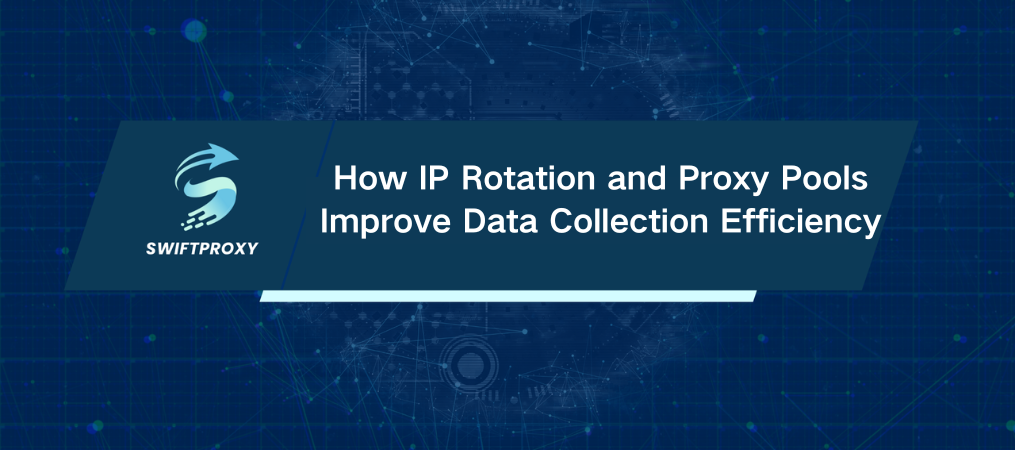How IP Rotation and Proxy Pools Improve Data Collection Efficiency

Imagine trying to collect data from a competitor's website, only to be met with a frustrating block or captcha every time. For businesses relying on online data, this is more than just a nuisance—it's a roadblock. In today's digital world, IP rotation and proxy pools are game changers, enabling uninterrupted access to the web, even with high-volume data scraping, SEO tasks, or managing multiple accounts. These tools aren't just nice-to-haves—they're essential for modern automation.
Let's dive into how these strategies work, why your business needs them, and how you can implement them to boost efficiency.
Understanding IP Rotation and Proxy Pools
While the concepts of IP rotation and proxy pools often overlap, they're distinct tools with unique roles in automation. Let's break them down.
IP Rotation
IP rotation is exactly what it sounds like—shifting through different IP addresses with each request or at regular intervals. This is a must-have for any task that requires high-volume web scraping or querying a site multiple times. By rotating IPs, businesses avoid detection and prevent blocks, essentially simulating multiple users. This technique ensures a smoother, uninterrupted connection, whether you’re monitoring competitors' prices or gathering user data.
Types of IPs that benefit from rotation include:
Residential Proxies: These are tied to real, residential IPs, making them harder to detect and block since the traffic looks like it's coming from genuine users.
Mobile Proxies: These IPs change frequently because they are linked to mobile network infrastructure, adding another layer of anonymity.
IP rotation can be dynamic, meaning the system automatically switches between different IPs either at set time intervals (time-based) or with each new request (link-based). This flexibility ensures businesses can fine-tune their automation processes to suit their needs.
Proxy Pool
A proxy pool is a collection of IPs—either static or dynamic—that you can pull from to maintain access to web resources. Think of it as a bucket of IP addresses that your automation tasks can choose from, ensuring that your requests never come from the same IP. Proxy pools often include:
Data Center Proxies: These are fast and reliable, but they can be easily detected since they don't belong to real users. They're ideal for tasks that require high-speed connections and don't need much anonymity.
ISP Proxies: These are a hybrid, providing the speed of data center proxies but with the trustworthiness of residential proxies. They're great for more sensitive tasks where reliability is crucial.
What makes proxy pools powerful is the flexibility they offer. You can set them up to rotate dynamically, mixing residential and mobile proxies to maintain anonymity and access stability.
Why IP Rotation and Proxy Pools Are Important for Your Business
Whether you're monitoring competitors'prices or gathering data for SEO, these tools help ensure smooth, uninterrupted processes:
Price Monitoring and Data Scraping: Avoid being blocked when gathering pricing data from competitors. With IP rotation, you can collect large amounts of data from multiple sources without triggering security mechanisms.
SEO Analytics: IP rotation helps you bypass search engine restrictions on queries. Proxy pools also let you gather data from different geographical regions, which is crucial for global SEO insights.
Social Media Management: If you're managing multiple social media accounts, IP rotation prevents account bans by making it look like different users are managing each account, even when you're using automation tools.
Regional Marketing Research: For businesses conducting market research in different locations, proxy pools help gather localized insights without being restricted by geo-blocks.
Key Considerations When Choosing Proxy Servers
Not all proxies are created equal. When selecting proxies for automation, consider:
Connection Speed and Reliability: Data center and ISP proxies are fast and reliable, perfect for tasks requiring quick data retrieval. Residential and mobile proxies, while more anonymous, can sometimes be slower due to varying network conditions.
Trust Factor: The more legitimate the proxy source, the less likely it is to trigger security systems. Residential and mobile proxies are seen as more trustworthy than data center proxies, which are often flagged as suspicious.
Growth Potential: If your business needs to scale quickly, dynamic proxies—like residential or mobile—are your best bet. They allow for a more flexible, scalable solution compared to static proxies.
Reliability and Cost: Paid proxies offer better reliability and security compared to free ones, which might be shared and less secure.
Setting Up Proxy Pools for Automation
Setting up IP rotation and proxy pools can be daunting, but tools like swiftproxy make the process easier by providing a streamlined interface. Here's how you can get started:
Set up a rotating proxy: Start by creating a new profile in swiftproxy. Under the "Proxy" tab, input your proxy server details, including the IP address, port, and authentication data. Then, choose whether you want time-based or link-based rotation.
Create a Proxy Pool: In the "Proxies" tab, you can add multiple proxies and check their functionality. Once verified, they will appear in your pool. From here, you can integrate them into your profiles as needed.
Integrate the Proxy Pool into Automation: Whether you're managing multiple accounts or performing large-scale data scraping, swiftproxy allows for easy proxy management across multiple profiles, enabling you to rotate IPs with minimal effort.
By integrating proxy rotation into your automation strategy, you ensure anonymity, improve efficiency, and reduce the risk of being blocked—all without compromising on performance.
Final Thoughts
IP rotation and proxy pools are essential for businesses that rely on web scraping, SEO, and other data-driven tasks. They ensure smooth operations without the constant risk of being blocked or restricted. While setting them up may take some time, the payoff is significant—improved access, faster data, and enhanced business intelligence. Incorporating these strategies can elevate your automation efforts.

















































